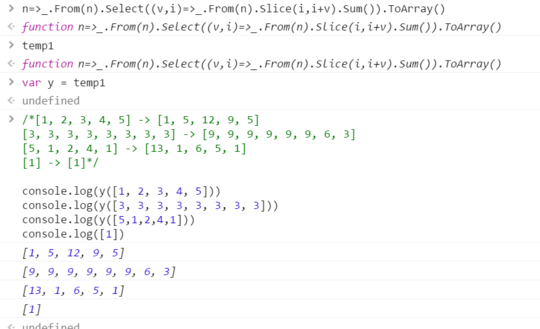26
Introduction
Let's observe this array: [3, 2, 4, 1, 1, 5, 1, 2].
Each element displays the length of the substring which must be summed up. Let's take a look at the first element of the above array:
[3, 2, 4, 1, 1, 5, 1, 2]
^
The element at the first index is 3, so we now take a substring of length three with the same index as the starting position:
[3, 2, 4]
When summed up, this results into 9, so the first element of the substring sum set is 9.
We do this for all the elements in the array:
3 -> [3, 2, 4]
2 -> [2, 4]
4 -> [4, 1, 1, 5]
1 -> [1]
1 -> [1]
5 -> [5, 1, 2]
1 -> [1]
2 -> [2]
You can see that the number 5 is a bit of a weird case. That number exceeds the length of the array:
[3, 2, 4, 1, 1, 5, 1, 2]
^ ^ ^ ^ ^
We'll ignore everything that exceeds the array, so we just use [5, 1, 2].
The last step is to sum everything up:
[3, 2, 4] -> 9
[2, 4] -> 6
[4, 1, 1, 5] -> 11
[1] -> 1
[1] -> 1
[5, 1, 2] -> 8
[1] -> 1
[2] -> 2
And that is the array that needs to be outputted:
[9, 6, 11, 1, 1, 8, 1, 2]
The Task
Given an non-empty array with positive (non-zero) integers, output the substring sum set. This is code-golf, so the submission with the smallest number of bytes wins!
Test cases
[1, 2, 3, 4, 5] -> [1, 5, 12, 9, 5]
[3, 3, 3, 3, 3, 3, 3, 3] -> [9, 9, 9, 9, 9, 9, 6, 3]
[5, 1, 2, 4, 1] -> [13, 1, 6, 5, 1]
[1] -> [1]

I think you mean "sub-list", not "substring". There's no strings. – mbomb007 – 2016-07-22T13:32:32.057
4@mbomb007 I think substring has the same meaning here as in the longest common substring problem, i.e., a subsequence whose elements are adjacent. Data types aside, a string is just a finite sequence of elements of an alphabet set (in this case, the positive integers). – Dennis – 2016-07-23T00:19:51.060